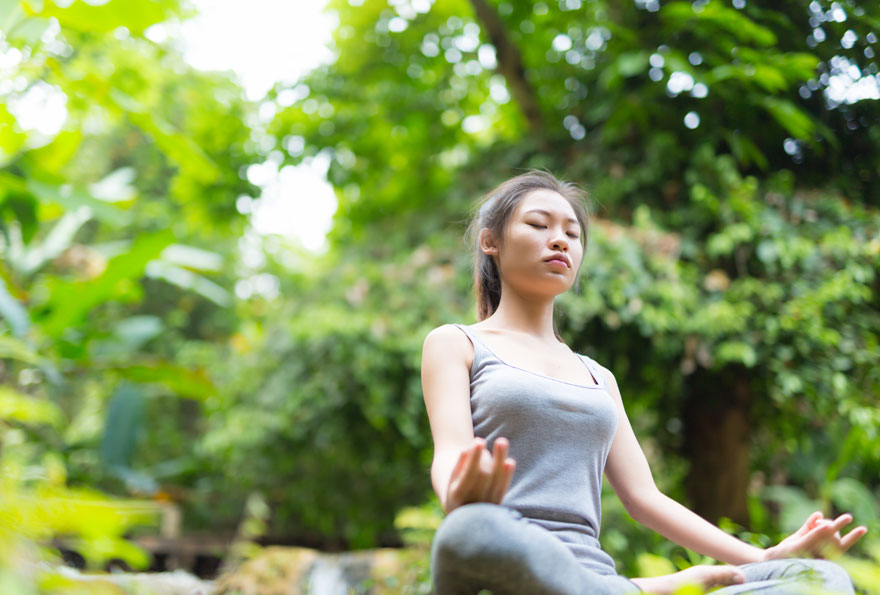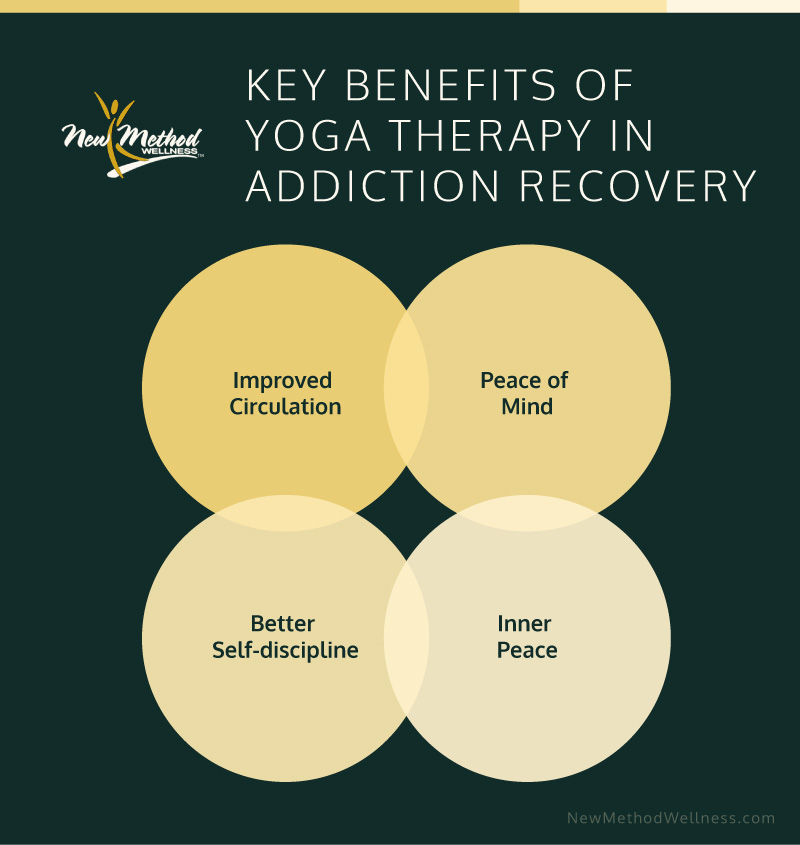Addiction recovery isn’t easy. It’s often a very long and dusty road. But, these days there are so many more ways to facilitate recovery beyond talk therapy and the 12-Step Program. Holistic addiction treatment is becoming even more common and popular alongside traditional methods. One such holistic treatment method is yoga therapy. Yoga has many benefits as both a physical exercise and a way to increase awareness and mindfulness.
What Is Yoga?
Yoga is a spiritual discipline that has existed since 3,000 BC. The Sanskrit word “yoga” actually means “yoke”. Why yoke? To yoke means to unite something. It works to unite your body, mind and spirit through physical forms and controlled breathing. It calms the mind and helps you feel clarity in your spirit. One misconception about yoga is that it’s a religion. However, it’s better to think of yoga as more of a philosophy or a discipline. Anyone of any religion can perform it.
Yoga has proven highly effective in relieving stress as well as increasing flexibility and physical fitness. The other appealing thing about yoga is that it can be done almost anywhere. You don’t need special equipment either.
Eight Limbs Of Yoga
Let’s explore a bit more about how yoga works. When you understand how each part of yoga works individually, you will also see how it has incredible benefits for those in addiction recovery.
1. Yama
This is the first limb of yoga, which is a concept of ethics. These ethics are useful for addicts as they mirror some of the ideas taught in the 12-Step Program. The ethics are as follows:
• Personal restraint
• No violence or aggression that might lead to violence
• No jealousy or theft
• Speaking only truth, no lies
• Personal dignity and respect
2. Niyama
The second limb encourages the study of various spiritual ideas such as being content in all situations, believing in some type of higher power and studying various religious texts with sincerity.
3. Asana
The third limb is the actual physical form of yoga, which is always the focus of yoga therapy during addiction recovery.
4. Pranayama
The fourth limb introduces the essential breathing exercises that allow you to complete the yoga poses. Breathing is very important for successful yoga practice.
5. Pratyahara
The fifth limb of yoga teaches meditation and mindfulness. Living in the present moment and allowing your thoughts to slow down encourages peace and reduces anxiety.
6. Dharana
The sixth limb works on cultivating intense concentration, which is helped by the physical yoga poses and regular meditation. Learning focus and concentration is one of the most important benefits for those in addiction recovery.
7. Dhyana
The seventh limb is an expansion of the sixth in that it takes intense focus and concentration to another level. Flowing concentration leads to increased self-knowledge.
8. Patanjali
The eighth limb is the feeling of joy and happiness when you have transcended yourself. It can be compared to the joy of finally beating addiction.
It’s important not to be overwhelmed by all the yoga precepts. Only very serious practitioners aim to achieve all of them. However, the limbs do give you something to focus on as you work on yoga in your addiction treatment program. There are many parallels in the Eight Limbs of Yoga to recovering from addiction.
How Yoga Therapy Benefits Your Addiction Recovery
Even knowing more about the origins and precepts of yoga, you might be wondering what benefits it has for addiction recovery. First, it’s important to understand that you will experience a lot of highs and lows during addiction recovery. Many days it might be hard to cope or to believe that you can win out. You might find yourself going between anxiety and depression. This is where yoga can help by centering and calming you. Take a look at the following five real benefits of yoga for addiction recovery:
1. Strength and flexibility – yoga improves physical fitness and flexibility. The calm and gentle motions combined with the meditative aspect can help you feel calmer, reduce your cravings and relieve any emotional distress.
2. Improved circulation – the stretching and movement also help improve circulation, which in turn lowers blood pressure and increases the flow of oxygen to your brain. Both work to raise your mood and reduce feelings of depression.
3. Peace of mind – people who practice yoga often report that the calming exercises make them feel more peaceful. Yoga can work as a coping strategy for those in addiction recovery.
4. Better self-discipline – challenging yoga is a commitment, and it can help you feel more confident about your ability to stay clean as you recover from addiction.
5. Spirituality – exploring your own spirituality is often encouraged in other substance abuse treatment programs. Yoga doesn’t tell you what to believe, but it encourages some belief in a higher power, which is similar to 12-Step.
Yoga Poses For Addiction Recovery
All yoga poses offer benefits for those in recovery, but there are certain poses and pose sequences that especially benefit addicts. Take a look at the following sequence and look up pictures of the movements to mimic them:
• Mountain pose
• Triangle pose
• Leg wall pose
• Spinal twist
• Corpse pose
The final pose allows you to lay on the floor, or your yoga mat, close your eyes and reach deep within yourself. After you’ve finished, sit up, open your eyes and notice how much more calm and relaxed you feel. This is a common reaction to any yoga practice.
Practice Easily Any Time and Anywhere
In some holistic treatment programs, you might find it harder to continue treatment once you leave. For example, equine therapy. Finding the time and money to continue working with horses might be difficult for some people. However, with yoga, you can easily continue practicing without buying any special equipment or going to a gym. Here are all the places you can keep practicing:
• In your living room
• At the office
• In your backyard
• At a park
• In the gym (if you decide to go)
Many people in recovery feel happier and healthier when they can pick up a new hobby or routine to help them cope with mood swings and other issues. Yoga is undoubtedly one of the easiest hobbies to pick up as you continue your recovery outside of a treatment center.
Let New Method Wellness Guide Your Recovery
New Method Wellness is a quality addiction treatment center offering many holistic treatment programs, including yoga. We fully understand the many benefits of holistic treatment alongside traditional treatment like psychotherapy. We are also committed to designing individualized treatment plans through careful dual diagnosis and investigation. If you or a loved one are seeking treatment for substance abuse, contact us today to find out more.
For more information about our addiction treatment methods, call 866.951.1824








